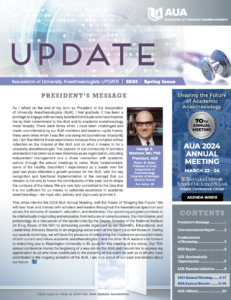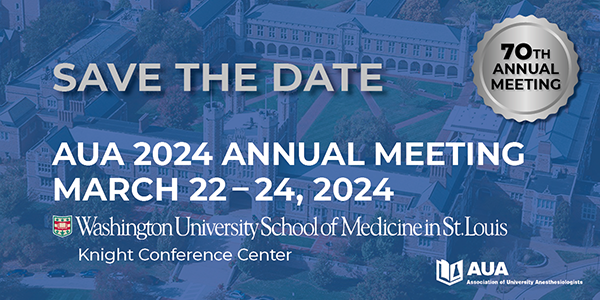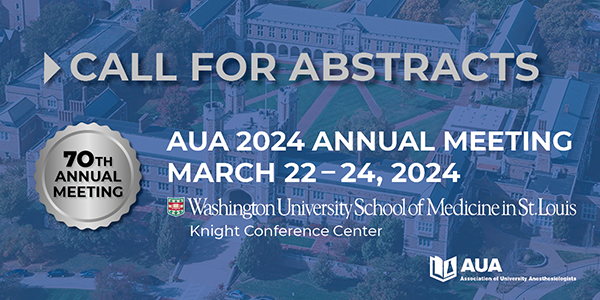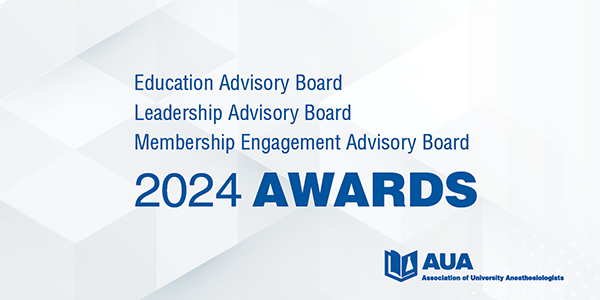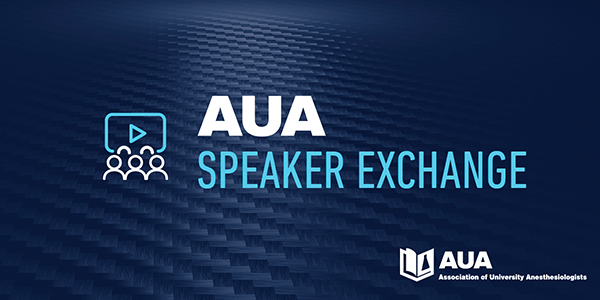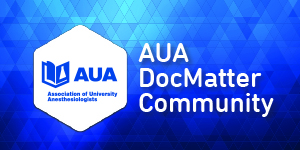Communications & Website Committee Report
As the Chair of the Communications Committee, it is my privilege to share insights into the Association of University Anesthesiologists' (AUA) most transformative year in the past decade. The transition to full independence and our distinct University-based Annual Meeting mark an exhilarating era, deserving acknowledgment of all parties involved. I encourage you to read Dr. Mashour's President's Message for an insightful recap of our journey and a glimpse into what lies ahead.
This Winter's AUA Update Newsletter is brimming with noteworthy contributions from the Council, Boards, and our members. Dr. Martinelli and the Educational Advisory Board (EAB) shed light on the upcoming Annual Meeting, focusing particularly on the pivotal role of artificial intelligence (AI) in medical education. This session, enriched by the expertise of leading professionals, will delve into AI's practical applications, offering perspectives from both the AMA and AAMC.
Dr. David Mintz and the Scientific Advisory Board (SAB) eagerly await an upcoming session that promises to stimulate dialogue on developing diverse research programs. The SAB will continue its highly acclaimed Mock Study Section, empowering junior faculty with practical grant review experience.
Additionally, forums for T32 directors and research award presentations highlight our commitment to fostering research excellence at all career stages in anesthesiology.
Drs. Armstead and Aziz report on the Membership Engagement Advisory Board's (MEB) innovative strategies to engage and add value to our members' experiences, including initiatives for military member anesthesiologists and the exploration of a user-friendly electronic app.
Dr. Odmara Barreto Chang and Niti Pawar from UCSF provide a critical analysis of the challenges and opportunities in cultivating a diverse pipeline of anesthesiologists. Their article offers valuable data and strategies for departments to consider in addressing diversity considerations.
In 'Using Coaching Skills as a Mentor,' Drs. Hopf and Martinelli eloquently discuss the importance of understanding the unique experiences of mentees. They advocate for integrating coaching skills in mentoring, emphasizing active listening and goal-setting. This approach will be further explored in a workshop at the AUA Annual Meeting, underscoring its significance in professional development.
Dr. Vidya T. Raman's insightful piece, 'Lessons to be Learned from Academic Setbacks,' addresses the current challenges in academic anesthesiology, such as workforce shortages and burnout. This article provides strategies to navigate and mitigate these issues effectively.
In closing, I am excited to be a part of the AUA's vibrant future. The buzz surrounding our upcoming Annual Meeting and its return to a university setting, complete with an outstanding agenda and opportunities for engaging dialogue, science, and networking, is palpable. Here's to a year of continued success and innovation!

